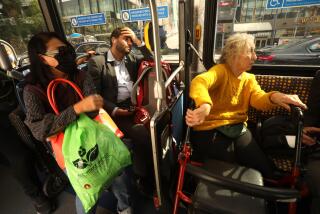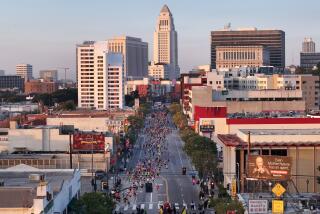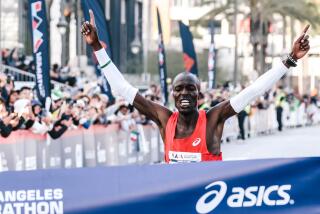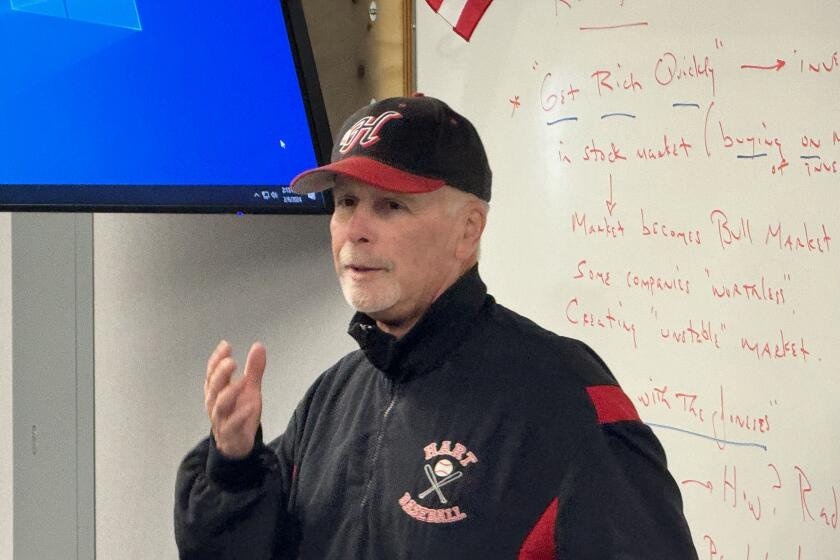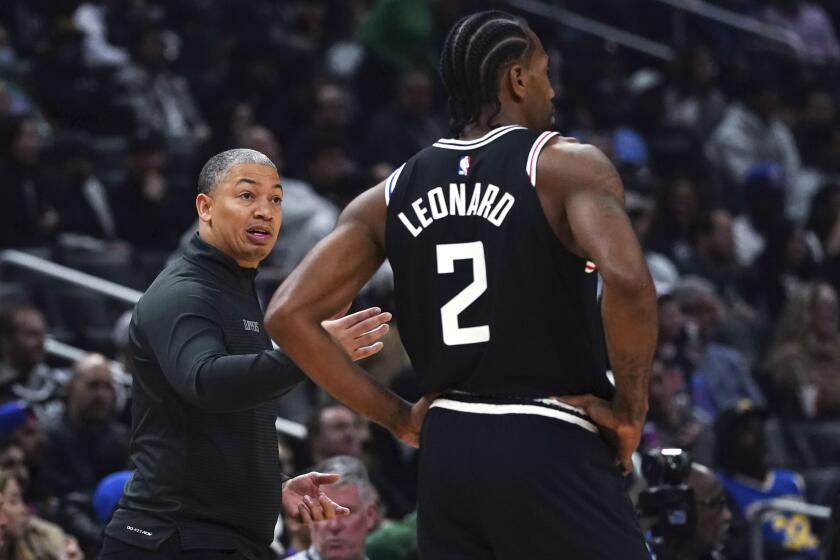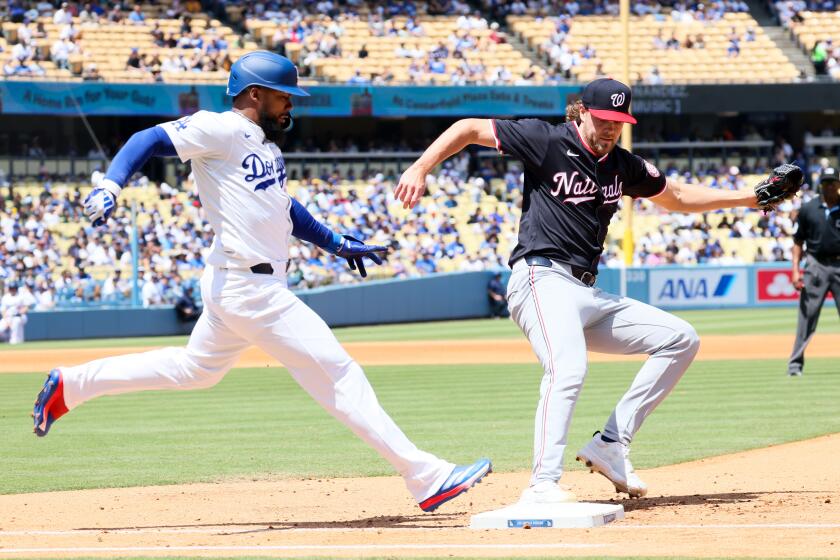He will run 26.2 miles in L.A. and not see it
At the starting line, some runners will shed their warm-up gear and Christian Alvarado will hear the jackets, sweaters and sweatpants hit the ground. The air will be warmed by the combined body heat of so many people clustered together.
In a moment, the first wave of the 20,000 or so runners will start in the 27th annual L.A. Marathon. But just before this happens Sunday, Alvarado will shed his sweater, revealing a light blue T-shirt with two lines centered chest-high on the front, “CHRISTIAN,” and below that, “I’M BLIND.”
Alvarado will notice details many runners might miss: nearby sweat, sour in varying degrees; the dog barking at a fence’s edge; the familiar sweetness of a miniature chocolate candy at a refreshment station and its ensuing sugar rush.
But unlike them, he cannot see where he’s going.
His dark brown eyes don’t give away that he can hardly see. They are healthy. However, the nerves that tell his brain what to see are not, a disorder known as optic nerve atrophy.
For the run, Christian will rely on a guide, Tania Gongora. She’ll be alongside, shoulder-to-shoulder, just inches away, tethered to him by a black shoelace. She’ll hold one end, he’ll grip the other. If he starts to veer off path, she’ll tug on her end to help him correct.
When necessary, she will guide his hands to a cup at water stations. Along the way, she’ll advise of every mile marker, every turn and warn of any bump, crack or debris, staying one step ahead to make sure his next one lands safely.
“It’s something I want to do right because he deserves it,” she says.
This will be their first marathon together and the first ever for Gongora, 22, from Van Nuys. But it will be the 11th for Alvarado, 26, of Mid-City. He’s completed seven in L.A., one in Long Beach and two in New York, all despite vision so poor he can see only the faintest of shadows with his left eye and slowly read 3-inch-tall magnified text with his right.
He manages, listening to audio books instead. He’s on his sixth about former president Franklin Roosevelt, who was crippled by polio.
“He saved the country,” Alvarado says. “He helped get us out of a depression. And back then, a lot of people believed having a disability was really an obstacle.
“He didn’t let a disability stop him.”
::
In the late 1980s, Christian and his family left war-torn El Salvador and moved to Los Angeles. Months after he arrived, he was diagnosed with Type 1 diabetes. A few years later, at age 7, his vision began fading.
At Los Angeles High School, where at 15 he walked the halls with a cane, he began to accept his disability. But by December 2004 of his senior year, he felt bored, unchallenged. He searched for something new.
His research led to marathons, and he decided to run in the L.A. Marathon the next March. Though he didn’t like running, he wanted to prove a disability couldn’t stop him or others like him.
“I don’t know if you’ve noticed or if you knew, but in the blind community, there are so many people that are couch potatoes, who are not doing anything with their life,” he said. “There’s so much that they can do.”
A track club offered 51/2 weeks of free professional training, but his trainer later told Christian that he’d need far more.
On mile 22 of the 26.2-mile run, Alvarado called his trainer and told him he was almost done. He finished in 6 hours 48 minutes 32 seconds. The next day, he wore his medal to class. He wore it to his high school graduation. He ran another marathon that year and was hooked.
Alvarado started giving inspirational speeches on behalf of the Fulfillment Fund, an L.A.-based organization that helps disadvantaged children pursue higher education.
It was through that organization, which helped Alvarado graduate from UC Santa Cruz last June with a bachelor’s degree in community studies, that he and Gongora met. She attended one of its events in October 2011 and heard one of his speeches. They talked after. He was looking for a new guide after his previous one had given up at mile 17, leaving him to find a replacement before finishing, which he did.
He asked Gongora, who hadn’t run a marathon before. She said yes.
::
Alvarado is 5 feet 6, a slender 150 pounds with a thick mop of black hair. He has a short stride with a pace somewhere between a run and a light jog.
Gongora guides him during their 10-mile runs around Balboa Park each weekend. Most other runners don’t realize Christian is blind unless they see the shoelace. If they do spot it, they often understand and respond with a thumbs-ups and a smile.
“Christian, this guy just passed by,” she’ll say. “He’s really proud of you.”
Their training is new for him. For other marathons, he trained little, as a treadmill wasn’t available and he lacked a guide to help him run outside. So, instead, he’d run in place, alone, in his bedroom or a garage for 30 minutes a day. “That was the best I could do,” he says.
In past marathons, he often ran the first two miles and power-walked the rest. His fastest finish was his first. He has completed the rest in upward of seven hours and most at more than nine. The barriers are often taken down by that time, allowing traffic to return to the roads, so he has finished most runs on a sidewalk.
But he doesn’t give up.
In 2007, at mile 20, a police officer, seeing that Alvarado looked as though he may pass out, pleaded with him to stop.
“We’re just trying to help you,” he said.
“I’m not going to stop.”
He didn’t.
In 2010, at mile 17, Alvarado had to be tended to by paramedics. His blood sugar was too low. A firefighter begged him to quit. They argued.
“My mom came over and asked if I was ready to go home, to give up.”
He wasn’t. His mother, Maria, power-walked with him to the finish.
::
Good job, Christian! Keep going! You’re almost there!
His shirt informs others of his disability, which leads to widespread encouragement, but it also acts as an explanation to other runners.
“They’ll understand that, ‘Oh, he didn’t bump into me because he’s mean. He bumped into me because it was an accident,’ ” Christian says.
He’s fallen a few times, once tripping over a sweater someone threw in the first mile. Another time, he nearly slipped on a banana peel.
He doesn’t mind being blind. If that never changes, he says he’ll be OK.
“Sometimes, it’s kind of fun,” Alvarado says, his nose crinkling in laughter.
He points to Faith, his seeing-eye dog, a black Labrador who sleeps by his bedside, near the dresser where he keeps his 10 marathon medals, in the apartment Alvarado shares with his mother, an aunt and a cousin.
He notes he can bring Faith into work at the Fulfillment Fund, where he’s a development intern, and onto a plane. But for as much as he relies on Faith and others, he can discern a few things by himself.
For instance, he doesn’t need a guide to know when he’s reached the halfway point of the marathon. The cheers will tell him that.
But there isn’t much else.
The only image to keep him company is that of a countdown clock in his head, ticking off a mile at a time as Gongora tells him they have passed another.
When he nears Santa Monica, where the marathon will end, he’ll smell the salty air and feel a cool breeze rolling off the water. And then, after he crosses the finish line, he’ll enjoy the sensation he loves most of all.
The weight of a medal around his neck.
twitter.com/baxterholmes
More to Read
Get our high school sports newsletter
Prep Rally is devoted to the SoCal high school sports experience, bringing you scores, stories and a behind-the-scenes look at what makes prep sports so popular.
You may occasionally receive promotional content from the Los Angeles Times.
